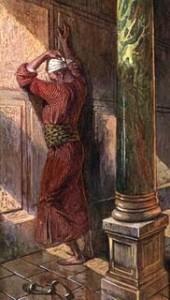Three movement improvisatory suite. I am attempting to reflect the concluding events of one of the Hebrew Scriptures most tragic stories. I realize that my skill is in no way equal to depicting the panoply of emotions described and evoked by 2 Samuel 12:16-23, but that won't stop me from trying!
Part 3: David Worships the Lord
David pleaded with God for the child. He fasted and spent the nights lying in sackclothon the ground. The elders of his household stood beside him to get him up from the ground, but he refused, and he would not eat any food with them. On the seventh day the child died.
David’s attendants were afraid to tell him that the child was dead, for they thought, “While the child was still living, he wouldn’t listen to us when we spoke to him. How can we now tell him the child is dead? He may do something desperate.”
David noticed that his attendants were whispering among themselves, and he realized the child was dead.
“Is the child dead?” he asked.
“Yes,” they replied, “he is dead.”
Then David got up from the ground. After he had washed, put on lotions and changed his clothes, he went into the house of the LORD and worshiped. Then he went to his own house, and at his request they served him food, and he ate. His attendants asked him, “Why are you acting this way? While the child was alive, you fasted and wept, but now that the child is dead, you get up and eat!”
He answered, “While the child was still alive, I fasted and wept. I thought, ‘Who knows? The LORD may be gracious to me and let the child live.’ But now that he is dead, why should I go on fasting? Can I bring him back again? I will go to him, but he will not return to me.”
Click HERE to go on to the next entry in the Improvisation Blog


